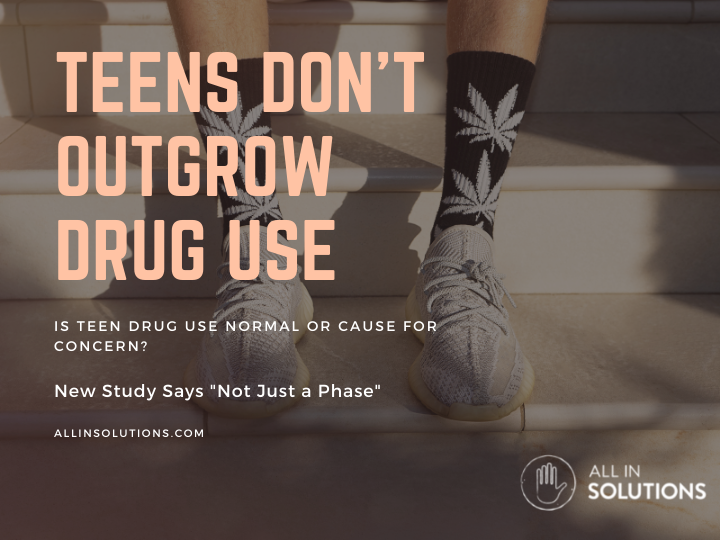Is Teen Drug Use Something Parents Should Worry About?
Teens' use of substances can have a major influence on their health as well as their overall wellbeing. This is why the American Academy of Pediatrics (AAP) through a collaboration arrangement together with Centers for Disease Control and Prevention (CDC)has come up with a plan to implement screening for substance abuse in the practices of children that will aid pediatricians in dealing with issues that stem from addiction. The AAP recommends screening for substance use among children beginning at the age of 9.
Motives behind teens using Drugs
There are many causes that could lead to teens using and abusing drugs. Most often, the first use occurs in social settings that have readily available drugs, such as alcohol and cigarettes.
Long-term use of drugs can result from anxiety or a desire to be accepted within society. Teenagers might feel they're not worth the risk and don't realize what consequences they could face from their decisions that could lead to putting their lives at risk by using drugs.
Drug use may result in dependence on drugs and severe impairment, as well as the death of a patient, or even illness. The health risks that come with commonly used drugs include:
It's likely that you'll engage in numerous conversations with your teenager regarding the use of drugs and alcohol. Be sure to choose times that are less likely to be interrupted. Also, keep your phones off. It's crucial to know of times when it's inappropriate to talk to someone such as when you're angry at your child or not ready to answer questions, or if your child is drinking or high.
What are the warning signs of Abuse in teens?
There's a good chance that you'll engage in many conversations with your teenager regarding drinking and using drugs. It is important to choose the times you're least susceptible to being interrupted. Also, ensure that your cell phone is off. It's crucial to be aware of when you should not engage in exchanges of words, for example, when you're upset at your child, when you're not prepared to answer questions as well when the child drunk or is high.
It's never too late to begin talking with your teenager about the risks of taking drugs. The conversations you are having now will aid your child in making better decisions for the future.
It's important to recognize the distinction between addiction and substance abuse. Teenagers frequently experiment with substances but aren't addicted.
Being aware of and preventing the use of substances can help stop the issue before it starts. Being an example to others and engaging in conversations about addiction can help in preventing the use of substances among teenagers.
The indicators that can help you to recognize if a teenager or adolescent may be suffering from problems with substance use are explained in the research by Dr. Ashish Bhatt, MD.
The majority of users who are new to drugs are less than 18, which is a significant percentage. The main reason for this is the experimentation with the use of drugs among teenagers. However, it's a regular event, but just because teens have tried the use of alcohol or drugs, it doesn't suggest that they're addicted. It's crucial to understand the reasons why some teens are enticed to risk-taking in the first place.

The risks associated with taking drugs
The majority of those who are addicted began taking drugs before they reached 21. Positively, the number of teens using substances is decreasing. If you suspect your child is using drugs There are options for treating addiction.
The danger for binge drinkers is greater of becoming addicted in people regardless of age The brain of teens is more susceptible to addiction. Involving teens in conversations about the dangers could help cut down on drinking in the early years.
These issues can hinder teens to form friendships or feel at ease at school. When you're an adult and have noticed the changes that your children's behavior has undergone, or have observed evidence of abuse, it is crucial to be aware of the risks. This blog post will discuss the impact of drugs on academic performance as well as what parents are able to do in order to stop teens from taking drugs or alcohol.
Major depression (MDD) is a known mental health issue that affects teens and adolescents. The connection between teenage substance abuse and depression could result in an endless cycle that has grave implications for school performance, and social interactions as well as for other teens. Teen substance abuse usually occurs when there are mental health issues, such as depression, anxiety, and mood along with behavioral and learning issues. Teens seeking treatment for addiction problems must always undergo a thorough examination of their overall health (including mental health). Research has shown that mental health issues must be addressed in conjunction to allow treatments to become effective.4
Teenage drug use could pose numerous dangers for adolescents with regard to academic issues as also physical and mental health problems and poor social connections and participation within the system of law. Teen drug use could be harmful to the child's friends, family, and the rest of society.
In addition, new research suggests teens don't outgrow drug use like many previously thought. On the contrary, substance abuse in teens and young adults is strongly predictive of substance use disorder in adulthood.
How do we stop teens from engaging in Drugs?
The setting of a teenager is a significant aspect of the likelihood of becoming addicted. Teens with access to drugs and alcohol are more susceptible to addiction. The availability of alcohol and other drugs is the biggest danger to addiction in teens and so education for parents and teenagers is vital. Clear communication between teenagers and parents, and secure handling and disposing of medications can save children's lives.5
The best method to stop children from taking risks that aren't beneficial to them is to replace the risk with safer ones.
Limits will let your teenager know that you're concerned. The challenge is to find an equilibrium between the need to control your actions and your desire to be self-sufficient.
Parents and guardians must be aware of their power to influence the development of their children through their teens. Adolescence is an entirely new and exciting time in family life. The changes needed aren't restricted to the relationship of teen parents with their youngsters. It's best for parents to be aware of the challenges that come with this stage, particularly those that could involve drinking alcohol or using substances. Parents should not be afraid to talk directly in front of their children regarding their experiences with substances, regardless of whether they've had issues in the past with alcohol or other drugs.
An excellent resource on how to educate kids about drug use is Parents The Anti-Drug. It is suggested that parents give explicit non-use-only warnings to their children about the use of drugs, smoking, and alcohol. It is vital that children and teens be aware of the rules and expectations set by parents are built on the affection of their parents and the care they give to their health. Parents should also be involved and be interested in their teenagers' friendships as well as events at social. Being present with teenagers and setting an example is essential. Even if addiction issues to substances occur in the lives of teenagers' parents and their family members are able to affect positive changes in the conduct and behavior of the child.

